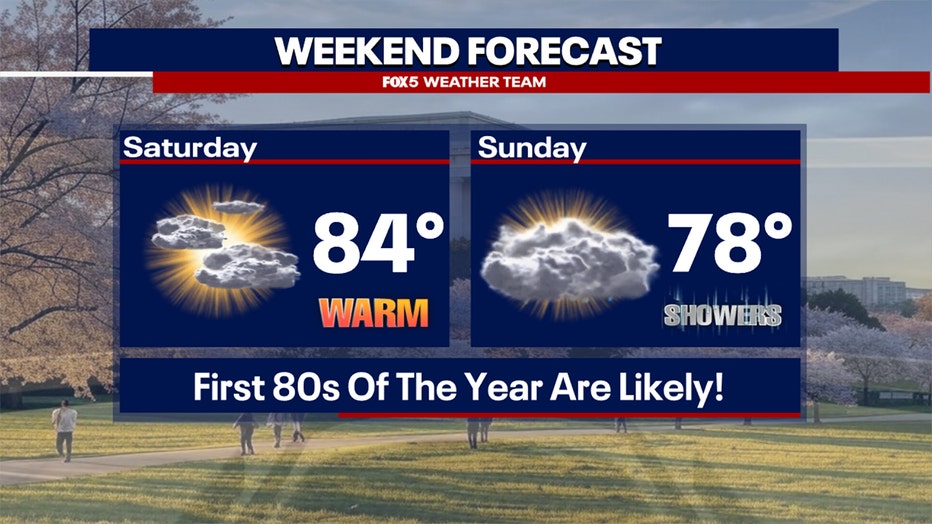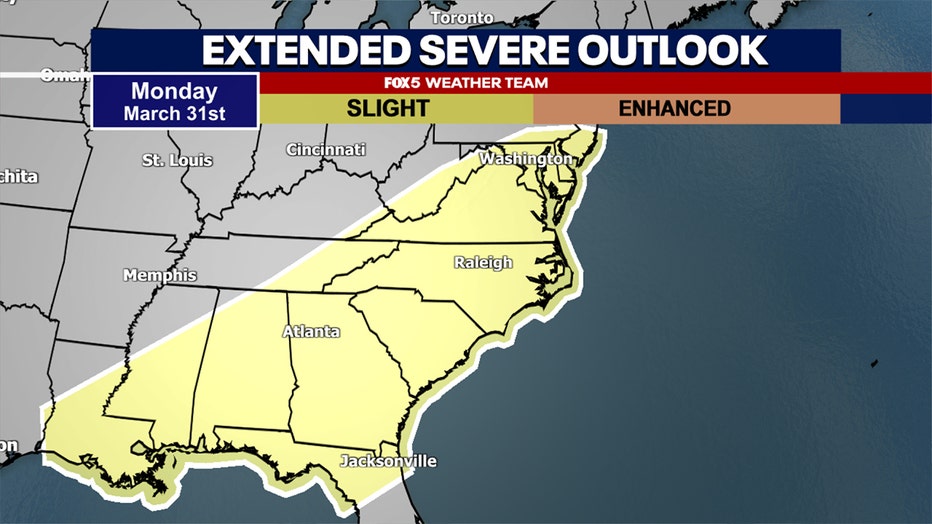Partial Solar Eclipse March 29: Here’s where and when to see it in DC

DC weekend forecast: Early summer feel
Sunshine is expected to mix with cloud cover while temperature sore through the 70s and into the lower to middle 80s on Saturday afternoon
WASHINGTON - Nearly a year after all the fanfare surrounding the Great American Eclipse of April 8th, 2024, did you know that the D.C. region will be treated to yet another glimpse of the moon passing in front of the sun? To compare the two events, however, is like comparing apples and oranges, the upcoming partial eclipse will not nearly as spectacular. Whereas in 202 nearly 90% of the visual surface area of the sun was eclipsed by the moon, this time around we are looking at just a measly 1% of coverage. Still impressive though to witness something often seen only a few times in a single lifetime.
Where to see the partial solar eclipse?
Unlike the April event last year that happened during the afternoon hours, you will need to be up early to witness this partial solar eclipse. The partial eclipse will begin prior to the sun even rising above our viewing horizon, so you will want to be up right at sunrise to view it fully. Sunrise is at 6:57 a.m. here in D.C. on Saturday, with the maximum partial eclipse for our region expected at 6:59 a.m. It should be the left side of the sun that will be slightly shielded by the moon. It will be a quick viewing as well, as the rotation of the earth will quickly separate the moon from the sun, with the partial eclipse set to end at 7:02 a.m.
Because of the timing of this partial eclipse, the sun will be very low on the horizon for viewing. An elevated location with an unobstructed view of the horizon will give you the best shot at seeing it. Remember you never want to look at the sun without proper eye protection. Using certified eclipse glasses, or a properly shielded camera or telescope lens is recommended for viewing, especially given how little of the sun will be covered by the moon. We unfortunately cannot promise that the weather will cooperate either. Some clouds do seem likely around sunrise Saturday.

Partial Solar Eclipse March 29: Here’s where and when to see it in DC
When is the next eclipse in Washington, D.C.?
Do not feel like rising early on a Saturday? Well, there are a few other opportunities to witness astronomical events in the years ahead. On March 3rd, 2026, our region will have a total lunar eclipse. This is where the shadow of the earth fully engulfs the moon, giving it a reddish coloring. We will be treated to another partial solar eclipse on August 12th of 2026, though this one will also be a small section of the sun. The next solar eclipse that will cover about half the sun here in Washington, D.C. will not be until January of 2029. The next major partial eclipse will be in June of 2048, then again in March 2052. Want to see a total solar eclipse in D.C.? You just need to find the fountain of youth! The next total solar eclipse overhead of Washington, D.C. will be in 2444.

DC weekend forecast: Early summer feel
DC weekend forecast: Early summer feel
The partial eclipse comes on what will likely be D.C.’s warmest day since November 7th of last year. Sunshine is expected to mix with cloud cover while temperature soar through the 70s and into the lower to middle 80s on Saturday afternoon. It will be prime weather for cherry blossom viewing at the Tidal Basin, which should be in peak bloom given the temperatures.
Warmth sticks around for Sunday, but the treat for rain showers will return by the afternoon and evening hours as well, so plan your blossom viewing accordingly.
Severe weather threat ends March
The adage goes that March comes in like a lion but goes out like a lamb. This year, March just may end with a lion's roar. After another afternoon of 70s and potentially some lower 80s, a strong cold front is expected to sweep the region on Monday afternoon into the evening hours. A line of showers and potentially strong thunderstorms is expected as this front sweeps through the D.C. region.
Gusty, damaging winds appear to be the greatest concern currently. The FOX 5 Weather Team will continue to monitor the threat and keep you updated in the days ahead.

Severe weather threat ends March
The Source: FOX 5 DC Weather Team

